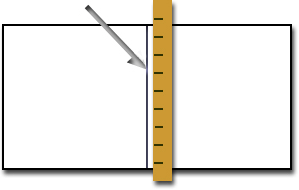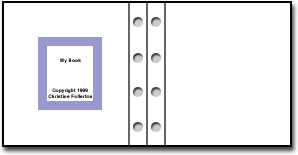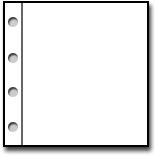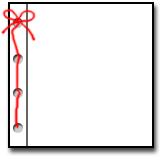

Each member of the family can be an author
You are writing your book for your child. How old is your child?
*Babies and toddlers need strong books. Make their books from cardboard.
They like bright colors as well as simple black and white pictures.
*Preschoolers like books that rhyme and repeat. They like what is familiar to them. They are learning to turn paper pages.
*Elementary children like stories. They also like facts. What is he or she interested in? They know how to handle a book now.
| Picture book | Poem or Rhyme Book | Story book | Fact book |
| with or without a theme (like people or kitchen things) | family tradition from a book made-up |
simple retelling old fairytale made-up from a book |
cut-outs research jokes & riddles songs cookbook |
Write some examples of books you could make. Which of your children would especially like them.
1. Decide who you are writing for ... then decide your topic.
2. Gather your picture ideas and make a quick design.
3. Gather your materials.
Directions:
1. Score your cover and fold it in half. (How to score paper. Decide where you want the fold to be. Put a ruler down the line. Run a pointed but not too sharp object down the line. Fold on the line.)

2. Draw the front cover. On the inside front, paste a copyright page. Fill in your information.
 |
 |
3. Plan your pages. Leave a margin for the binding of the book.
|
4. Punch in an EVEN number of holes about 1/4 inch from the spine in the
cover. Then punch holes in your pages. Be careful to line up your holes with the cover. Score a fold line on the cover and the pages so that the book will open and lie flat.
5. Paste in the pictures and then write the word, if you have any. (Lamination optional.) 6. Bind the book with yam. 7. Read often and make lots more with your children!! |
 |
Reading Stages:
Pre-Reading
When we learn about books-- the joy of reading-- as well as how to turn pages and what is the front.
What other kinds of things must kids know about books?
How do they learn JOY with reading?
Decoding Stage In this stage kids have some idea that certain letters have certain sounds. They also have memorized some sight words. They put this information together to be able to read. They sometimes forget what they sounded out as they are sounding out new words. They also don't listen very well to what they read because they are paying attention to decoding. So, knowing what they are reading about (reading comprehension) sometimes is a problem. It's normal!
Think about it!
Reading for Fluency and Smoothness
In this stage, kids want to read like "good readers." So they read to sound smooth. Sometimes they don't read words or make up words that start with the same letter, all just to sound smooth. They want to be good readers. MOTIVATION to read. They don't like to be stopped to sound out a word. It kills the flow. All this is NORMAL and a part of the stages. They will change... to the next stage.
It makes reading special.
Reading for Information
Kids read to learn things. They like facts or stories with real life type characters. In this stage they will look up words they don't know and struggle with pronouncing words. They want to master them. They already know they can read smoothly.
It makes us hungry for knowledge!
Reading to incorporate knowledge into our lives
Kids don't do this often. But neither do adults do this ALL the time. We are also in all the other stages.
When we take information we read and make it a part of our attitudes and the way we live, then we are reading in this stage. When you read about reading stages and say "Wow! That is why my kid does that" and you remember the information because it is so personal to you, then you are reading in this higher stage.
What have you read?
When we read a flyer, we read for information; when we read a vocabulary list, we probably need to do some decoding. When we read a GED® book and we guess at the word, we are in a smoothness stage. It is normal for us and for our kids. Nobody tries to make mistakes. We just have different things we want TO KNOW when we read certain things.
Practice reading your book so that you are smooth and fluent. Then your child can learn it from you. You might even point out the words that you are reading so the child knows that print is special.
Book Materials List
|
|
|
|||||||||
| ||||||||||